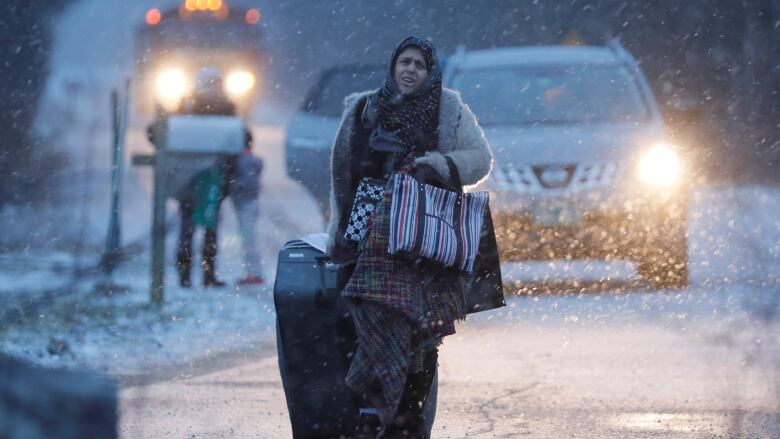'It's kind of late to complain about immigration,' says Indigenous writer Doug Cuthand
The markings of immigration can be seen across Canada's Prairie provinces

I find it peculiar to see Indigenous people talk about immigration.
On one hand, it could be traced to the source of many of our woes, and on the other, it could be an important part of our future success.
I come from the Great Plains. My people originally lived in the Cypress Hills and our chief wanted a reserve there after he signed Treaty 6. The government would have nothing of it and we were sent north to the Battle River, west of Fort Battleford.
The John A. MacDonald government was adamant that they would clear the plains and open them up for the railways and settlement. As far as they were concerned, the Indigenous people really had no place in the new country of Canada.
The Mtis were also a source of concern for the government, since they were feeling pressure from the Orangemen to ensure the new settlements be Protestant and not Catholic. The thought of Louis Riel proclaiming a Mtis nation brought out the long simmering resentment against Catholics.
There were politicians and pressure groups that advocated a British west, but the land was so huge that the land companies encouraged people from all over Europe to settle the West.
Diversity across the Prairies
Today as you travel across the three Prairie provinces, you will pass through Icelandic settlements in Manitoba, Ukrainian settlements in Saskatchewan and French towns in Alberta. Among all of the provinces, there is a healthy sprinkling of Italian, Russian, Nordic and so on.
My wife and I raised our family in Saskatoon's west side, in a neighbourhood the real estate companies called entry level. It was a working-class neighbourhood with a healthy smattering of Aboriginal families.
In the 1980s,the people from Vietnam, Cambodia and Laos began to arrive. Then came the Bosnians and Serbians; next came the people from Somalia and Afghanistan.
Every time there was a country in crisis, we could count on them for our new neighbours.
It was a healthy neighbourhood and our children grew up experiencing a rich mix of cultures.
Today the city has a growing Muslim population, with several mosques either built or under construction.
There are 35 million people in Canada and only 1 million of us are members of the original First Nations. What difference will a few more make?
I resent people who try to exploit fear and xenophobia, such as Kellie Leitch, who goes on about Canadian values. She fails to mention values that created the Charter of Rights and Freedoms, medicare, the social safety net and other groundbreaking social programs.
So it's kind of odd as an Indigenous person to sit and watch refugees cross the border into Canada.
It's kind of late to complain about immigration. There are 35 million people in Canada and only 1 million of us are members of the original First Nations. What difference will a few more make?
Nor do I really care about their race or religion, as long as they don't bother us or try to get us to change our religion or place us in some kind of segregation.
In fact, I'm quite happy that more people of colour and diversity are coming to this country. We need a country that reflects more of the world's population if we are truly to become a country of the future.
Those who complain that refugees cost us money should remember that after a year or so of working and paying taxes, they will be net contributors to the country.
History repeats
Following the events of 1885,Mtis and First Nations people fled to the United States, fearing reprisals from the Canadian government. We had participated in the so-called Riel Rebellion, the Siege of Battleford and various other skirmishes and defensive battles, such as the Battle of Cutknife Hill.
Our leadership had been incarcerated at Stony Mountain penitentiary and the Department of Indian Affairs was conducting a reign of terror.
My great-grandfather was in Stony Mountain and my grandfather and his mother joined those fleeing to the United States. They joined with others at a large camp in Great Falls, Mont., in1886.
By the turn of the century, the Americans were rounding up all those "stray Indians" from Canada and marching them to the border. My grandfather was rounded up in the sweep and sent back.
They were accompanied by a platoon of American cavalry. This large group of Cree, Assiniboine and Saulteaux people with their horses and wagons were met at the border by two members of the RCMP. These two men came from the Fort Macleod detachment and they sorted everyone out and dispatched them to their various reserves.
One of the RCMPofficers, Const.Davis, accompanied the people back to Saskatchewan, including my grandfather, who returned to our reserve west of Fort Battleford.
We were reverse refugeesbut nonetheless, we made Canada our home, and I don't begrudge those coming here for a better life.












_(720p).jpg)


 OFFICIAL HD MUSIC VIDEO.jpg)
.jpg)



























































































